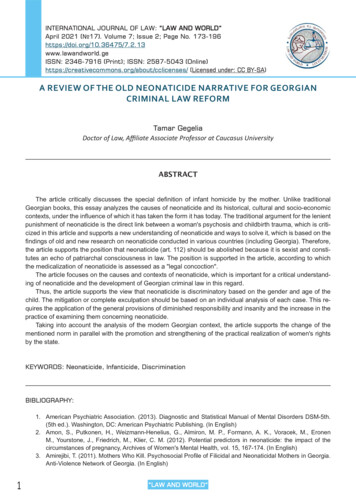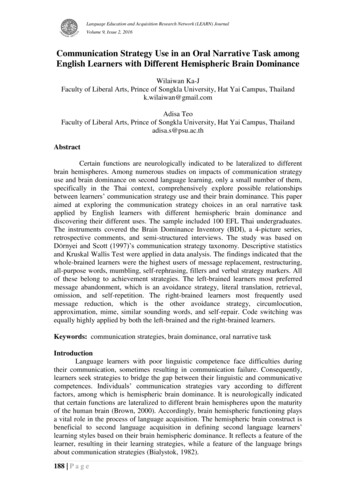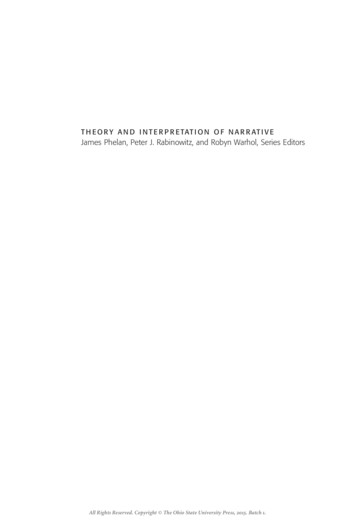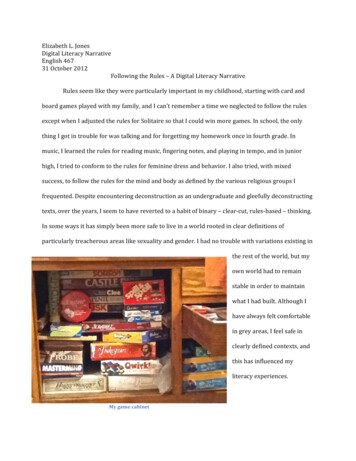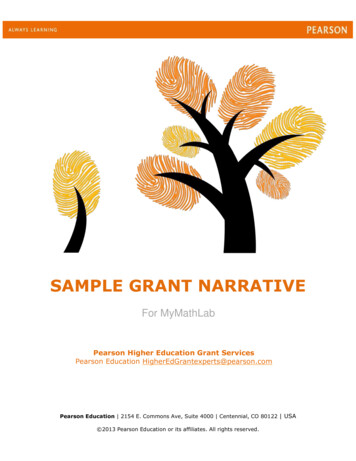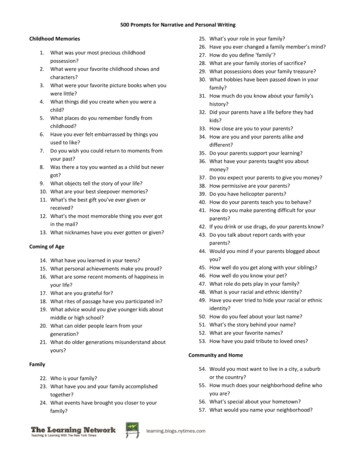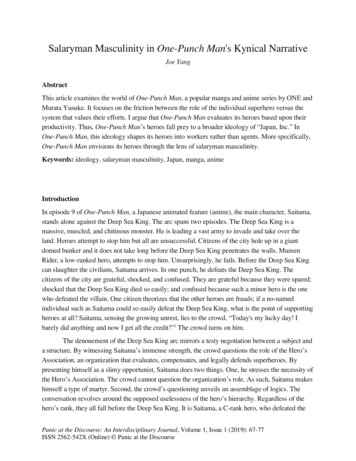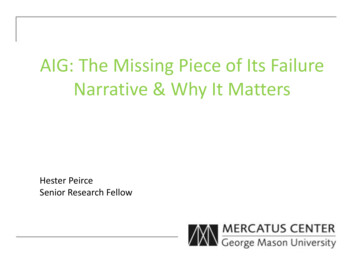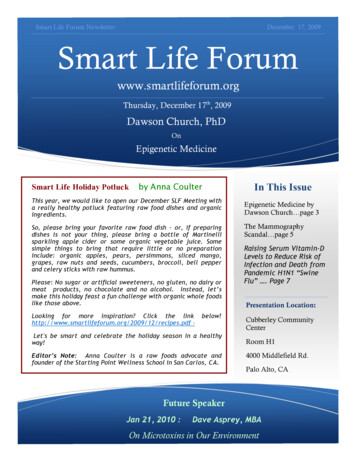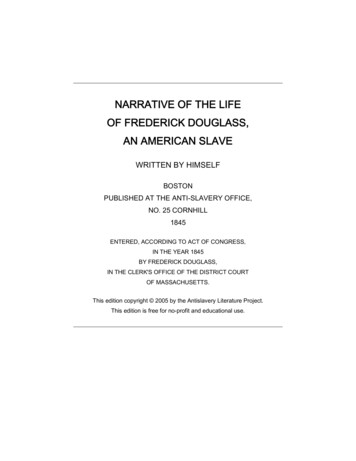
Transcription
NARRATIVE OF THE LIFEOF FREDERICK DOUGLASS,AN AMERICAN SLAVEWRITTEN BY HIMSELFBOSTONPUBLISHED AT THE ANTI-SLAVERY OFFICE,NO. 25 CORNHILL1845ENTERED, ACCORDING TO ACT OF CONGRESS,IN THE YEAR 1845BY FREDERICK DOUGLASS,IN THE CLERK'S OFFICE OF THE DISTRICT COURTOF MASSACHUSETTS.This edition copyright 2005 by the Antislavery Literature Project.This edition is free for no-profit and educational use.
2Daguerrotype by J.W. Hurn.The image is probably from immediately following the Civil War,when Douglass was 47-49 years old.
3Electronic ResourcesTexts Available OnlineDouglass, My Bondage and My Freedom. Part I. Life as a Slave. Part II. Life as aFreeman. New York: Miller, Orton & Mulligan, 1855. Digitized by Documenting theAmerican South.---, “The Meaning of July Fourth to the Negro,” (1852). Digitized by PBS.----, “An Appeal to Congress for Impartial Suffrage,” (January 1867). Digitized bythe University of Oklahoma Law Center.Historical SitesFrederick Douglass National Historic Site (Washington, DC)ResearchFrederick Douglass Papers Project (Indiana University-Perdue University)The Frederick Douglass Papers (Library of Congress)Other ResourcesWikipedia article on ‘Frederick Douglass’Date: August 2005
4PREFACEby William Lloyd GarrisonIn the month of August, 1841, I attended an anti‐slavery convention inNantucket, at which it was my happiness to become acquainted withFREDERICK DOUGLASS, the writer of the following Narrative. He was astranger to nearly every member of that body; but, having recently made hisescape from the southern prison‐house of bondage, and feeling his curiosityexcited to ascertain the principles and measures of the abolitionists,‐‐of whom hehad heard a somewhat vague description while he was a slave,‐‐he was inducedto give his attendance, on the occasion alluded to, though at that time a residentin New Bedford.Fortunate, most fortunate occurrence!‐‐fortunate for the millions of hismanacled brethren, yet panting for deliverance from their awful thraldom!‐‐fortunate for the cause of negro emancipation, and of universal liberty!‐‐fortunate for the land of his birth, which he has already done so much to saveand bless!‐‐fortunate for a large circle of friends and acquaintances, whosesympathy and affection he has strongly secured by the many sufferings he hasendured, by his virtuous traits of character, by his ever‐abiding remembrance ofthose who are in bonds, as being bound with them!‐‐fortunate for the multitudes,in various parts of our republic, whose minds he has enlightened on the subjectof slavery, and who have been melted to tears by his pathos, or roused tovirtuous indignation by his stirring eloquence against the enslavers of men!‐‐fortunate for himself, as it at once brought him into the field of public usefulness,ʺgave the world assurance of a MAN,ʺ quickened the slumbering energies of hissoul, and consecrated him to the great work of breaking the rod of the oppressor,and letting the oppressed go free!I shall never forget his first speech at the convention‐‐the extraordinaryemotion it excited in my own mind‐‐the powerful impression it created upon acrowded auditory, completely taken by surprise‐‐the applause which followedfrom the beginning to the end of his felicitous remarks. I think I never hatedslavery so intensely as at that moment; certainly, my perception of the enormousoutrage which is inflicted by it, on the godlike nature of its victims, was renderedfar more clear than ever. There stood one, in physical proportion and staturecommanding and exact‐‐in intellect richly endowed‐‐in natural eloquence aprodigy‐‐in soul manifestly ʺcreated but a little lower than the angelsʺ‐‐yet aslave, ay, a fugitive slave,‐‐trembling for his safety, hardly daring to believe thaton the American soil, a single white person could be found who would befriendhim at all hazards, for the love of God and humanity! Capable of highattainments as an intellectual and moral being‐‐needing nothing but acomparatively small amount of cultivation to make him an ornament to societyand a blessing to his race‐‐by the law of the land, by the voice of the people, bythe terms of the slave code, he was only a piece of property, a beast of burden, achattel personal, nevertheless!A beloved friend from New Bedford prevailed on Mr. DOUGLASS toaddress the convention: He came forward to the platform with a hesitancy and
5embarrassment, necessarily the attendants of a sensitive mind in such a novelposition. After apologizing for his ignorance, and reminding the audience thatslavery was a poor school for the human intellect and heart, he proceeded tonarrate some of the facts in his own history as a slave, and in the course of hisspeech gave utterance to many noble thoughts and thrilling reflections. As soonas he had taken his seat, filled with hope and admiration, I rose, and declaredthat PATRICK HENRY, of revolutionary fame, never made a speech moreeloquent in the cause of liberty, than the one we had just listened to from the lipsof that hunted fugitive. So I believed at that time‐‐such is my belief now. Ireminded the audience of the peril which surrounded this self‐emancipatedyoung man at the North,‐‐even in Massachusetts, on the soil of the PilgrimFathers, among the descendants of revolutionary sires; and I appealed to them,whether they would ever allow him to be carried back into slavery,‐‐law or nolaw, constitution or no constitution. The response was unanimous and inthunder‐tones‐‐ʺNO!ʺ ʺWill you succor and protect him as a brother‐man‐‐aresident of the old Bay State?ʺ ʺYES!ʺ shouted the whole mass, with an energy sostartling, that the ruthless tyrants south of Mason and Dixonʹs line might almosthave heard the mighty burst of feeling, and recognized it as the pledge of aninvincible determination, on the part of those who gave it, never to betray himthat wanders, but to hide the outcast, and firmly to abide the consequences.It was at once deeply impressed upon my mind, that, if Mr. DOUGLASScould be persuaded to consecrate his time and talents to the promotion of theanti‐slavery enterprise, a powerful impetus would be given to it, and a stunningblow at the same time inflicted on northern prejudice against a coloredcomplexion. I therefore endeavored to instil hope and courage into his mind, inorder that he might dare to engage in a vocation so anomalous and responsiblefor a person in his situation; and I was seconded in this effort by warm‐heartedfriends, especially by the late General Agent of the Massachusetts Anti‐SlaverySociety, Mr. JOHN A. COLLINS, whose judgment in this instance entirelycoincided with my own. At first, he could give no encouragement; withunfeigned diffidence, he expressed his conviction that he was not adequate to theperformance of so great a task; the path marked out was wholly an untroddenone; he was sincerely apprehensive that he should do more harm than good.After much deliberation, however, he consented to make a trial; and ever sincethat period, he has acted as a lecturing agent, under the auspices either of theAmerican or the Massachusetts Anti‐Slavery Society. In labors he has been mostabundant; and his success in combating prejudice, in gaining proselytes, inagitating the public mind, has far surpassed the most sanguine expectations thatwere raised at the commencement of his brilliant career. He has borne himselfwith gentleness and meekness, yet with true manliness of character. As a publicspeaker, he excels in pathos, wit, comparison, imitation, strength of reasoning,and fluency of language. There is in him that union of head and heart, which isindispensable to an enlightenment of the heads and a winning of the hearts ofothers. May his strength continue to be equal to his day! May he continue toʺgrow in grace, and in the knowledge of God,ʺ that he may be increasinglyserviceable in the cause of bleeding humanity, whether at home or abroad!It is certainly a very remarkable fact, that one of the most efficient advocates ofthe slave population, now before the public, is a fugitive slave, in the person of
6FREDERICK DOUGLASS; and that the free colored population of the UnitedStates are as ably represented by one of their own number, in the person ofCHARLES LENOX REMOND, whose eloquent appeals have extorted the highestapplause of multitudes on both sides of the Atlantic. Let the calumniators of thecolored race despise themselves for their baseness and illiberality of spirit, andhenceforth cease to talk of the natural inferiority of those who require nothingbut time and opportunity to attain to the highest point of human excellence.It may, perhaps, be fairly questioned, whether any other portion of thepopulation of the earth could have endured the privations, sufferings andhorrors of slavery, without having become more degraded in the scale ofhumanity than the slaves of African descent. Nothing has been left undone tocripple their intellects, darken their minds, debase their moral nature, obliterateall traces of their relationship to mankind; and yet how wonderfully they havesustained the mighty load of a most frightful bondage, under which they havebeen groaning for centuries! To illustrate the effect of slavery on the white man,‐‐to show that he has no powers of endurance, in such a condition, superior tothose of his black brother,‐‐DANIEL OʹCONNELL, the distinguished advocate ofuniversal emancipation, and the mightiest champion of prostrate but notconquered Ireland, relates the following anecdote in a speech delivered by him inthe Conciliation Hall, Dublin, before the Loyal National Repeal Association,March 31, 1845. ʺNo matter,ʺ said Mr. OʹCONNELL, ʺunder what specious termit may disguise itself, slavery is still hideous. It has a natural, an inevitabletendency to brutalize every noble faculty of man. An American sailor, who wascast away on the shore of Africa, where he was kept in slavery for three years,was, at the expiration of that period, found to be imbruted and stultified‐‐he hadlost all reasoning power; and having forgotten his native language, could onlyutter some savage gibberish between Arabic and English, which nobody couldunderstand, and which even he himself found difficulty in pronouncing. Somuch for the humanizing influence of THE DOMESTIC INSTITUTION!ʺAdmitting this to have been an extraordinary case of mental deterioration, itproves at least that the white slave can sink as low in the scale of humanity as theblack one.Mr. DOUGLASS has very properly chosen to write his own Narrative, inhis own style, and according to the best of his ability, rather than to employ someone else. It is, therefore, entirely his own production; and, considering how longand dark was the career he had to run as a slave,‐‐how few have been hisopportunities to improve his mind since he broke his iron fetters,‐‐it is, in myjudgment, highly creditable to his head and heart. He who can peruse it withouta tearful eye, a heaving breast, an afflicted spirit,‐without being filled with anunutterable abhorrence of slavery and all its abettors, and animated with adetermination to seek the immediate overthrow of that execrable system,‐‐without trembling for the fate of this country in the hands of a righteous God,who is ever on the side of the oppressed, and whose arm is not shortened that itcannot save,‐‐must have a flinty heart, and be qualified to act the part of atrafficker ʺin slaves and the souls of men.ʺ I am confident that it is essentially truein all its statements; that nothing has been set down in malice, nothingexaggerated, nothing drawn from the imagination; that it comes short of thereality, rather than overstates a single fact in regard to SLAVERY AS IT IS. The
7experience of FREDERICK DOUGLASS, as a slave, was not a peculiar one; his lotwas not especially a hard one; his case may be regarded as a very fair specimenof the treatment of slaves in Maryland, in which State it is conceded that they arebetter fed and less cruelly treated than in Georgia, Alabama, or Louisiana. Manyhave suffered incomparably more, while very few on the plantations havesuffered less, than himself. Yet how deplorable was his situation! what terriblechastisements were inflicted upon his person! what still more shocking outrageswere perpetrated upon his mind! with all his noble powers and sublimeaspirations, how like a brute was he treated, even by those professing to have thesame mind in them that was in Christ Jesus! to what dreadful liabilities was hecontinually subjected! how destitute of friendly counsel and aid, even in hisgreatest extremities! how heavy was the midnight of woe which shrouded inblackness the last ray of hope, and filled the future with terror and gloom! whatlongings after freedom took possession of his breast, and how his miseryaugmented, in proportion as he grew reflective and intelligent,‐‐thusdemonstrating that a happy slave is an extinct man! how he thought, reasoned,felt, under the lash of the driver, with the chains upon his limbs! what perils heencountered in his endeavors to escape from his horrible doom! and how signalhave been his deliverance and preservation in the midst of a nation of pitilessenemies!This Narrative contains many affecting incidents, many passages of greateloquence and power; but I think the most thrilling one of them all is thedescription DOUGLASS gives of his feelings, as he stood soliloquizing respectinghis fate, and the chances of his one day being a freeman, on the banks of theChesapeake Bay‐‐viewing the receding vessels as they flew with their whitewings before the breeze, and apostrophizing them as animated by the livingspirit of freedom. Who can read that passage, and be insensible to its pathos andsublimity? Compressed into it is a whole Alexandrian library of thought, feeling,and sentiment‐‐all that can, all that need be urged, in the form of expostulation,entreaty, rebuke, against that crime of crimes,‐‐making man the property of hisfellow‐man! O, how accursed is that system, which entombs the godlike mind ofman, defaces the divine image, reduces those who by creation were crownedwith glory and honor to a level with four‐footed beasts, and exalts the dealer inhuman flesh above all that is called God! Why should its existence be prolongedone hour? Is it not evil, only evil, and that continually? What does its presenceimply but the absence of all fear of God, all regard for man, on the part of thepeople of the United States? Heaven speed its eternal overthrow!So profoundly ignorant of the nature of slavery are many persons, thatthey are stubbornly incredulous whenever they read or listen to any recital of thecruelties which are daily inflicted on its victims. They do not deny that the slavesare held as property; but that terrible fact seems to convey to their minds no ideaof injustice, exposure to outrage, or savage barbarity. Tell them of cruelscourgings, of mutilations and brandings, of scenes of pollution and blood, of thebanishment of all light and knowledge, and they affect to be greatly indignant atsuch enormous exaggerations, such wholesale misstatements, such abominablelibels on the character of the southern planters! As if all these direful outrageswere not the natural results of slavery! As if it were less cruel to reduce a humanbeing to the condition of a thing, than to give him a severe flagellation, or to
8deprive him of necessary food and clothing! As if whips, chains, thumb‐screws,paddles, bloodhounds, overseers, drivers, patrols, were not all indispensable tokeep the slaves down, and to give protection to their ruthless oppressors! As if,when the marriage institution is abolished, concubinage, adultery, and incest,must not necessarily abound; when all the rights of humanity are annihilated,any barrier remains to protect the victim from the fury of the spoiler; whenabsolute power is assumed over life and liberty, it will not be wielded withdestructive sway! Skeptics of this character abound in society. In some fewinstances, their incredulity arises from a want of reflection; but, generally, itindicates a hatred of the light, a desire to shield slavery from the assaults of itsfoes, a contempt of the colored race, whether bond or free. Such will try todiscredit the shocking tales of slaveholding cruelty which are recorded in thistruthful Narrative; but they will labor in vain. Mr. DOUGLASS has franklydisclosed the place of his birth, the names of those who claimed ownership in hisbody and soul, and the names also of those who committed the crimes which hehas alleged against them. His statements, therefore, may easily be disproved, ifthey are untrue.In the course of his Narrative, he relates two instances of murderouscruelty,‐‐in one of which a planter deliberately shot a slave belonging to aneighboring plantation, who had unintentionally gotten within his lordlydomain in quest of fish; and in the other, an overseer blew out the brains of aslave who had fled to a stream of water to escape a bloody scourging. Mr.DOUGLASS states that in neither of these instances was any thing done by wayof legal arrest or judicial investigation. The Baltimore American, of March 17,1845, relates a similar case of atrocity, perpetrated with similar impunity‐‐asfollows:‐‐ʺShooting a slave.ʺ‐‐We learn, upon the authority of a letter fromCharles county, Maryland, received by a gentleman of this city, that a youngman, named Matthews, a nephew of General Matthews, and whose father, it isbelieved, holds an office at Washington, killed one of the slaves upon his fatherʹsfarm by shooting him. The letter states that young Matthews had been left incharge of the farm; that he gave an order to the servant, which was disobeyed,when he proceeded to the house, obtained a gun, and, returning, shot theservant. He immediately, the letter continues, fled to his fatherʹs residence, wherehe still remains unmolested.ʺ‐‐Let it never be forgotten, that no slaveholder oroverseer can be convicted of any outrage perpetrated on the person of a slave,however diabolical it may be, on the testimony of colored witnesses, whetherbond or free. By the slave code, they are adjudged to be as incompetent to testifyagainst a white man, as though they were indeed a part of the brute creation.Hence, there is no legal protection in fact, whatever there may be in form, for theslave population; and any amount of cruelty may be inflicted on them withimpunity. Is it possible for the human mind to conceive of a more horrible stateof society?The effect of a religious profession on the conduct of southern masters isvividly described in the following Narrative, and shown to be any thing butsalutary. In the nature of the case, it must be in the highest degree pernicious.The testimony of Mr. DOUGLASS, on this point, is sustained by a cloud ofwitnesses, whose veracity is unimpeachable. ʺA slaveholderʹs profession of
9Christianity is a palpable imposture. He is a felon of the highest grade. He is aman‐stealer. It is of no importance what you put in the other scale.ʺReader! are you with the man‐stealers in sympathy and purpose, or onthe side of their down‐trodden victims? If with the former, then are you the foeof God and man. If with the latter, what are you prepared to do and dare in theirbehalf? Be faithful, be vigilant, be untiring in your efforts to break every yoke,and let the oppressed go free. Come what may‐‐cost what it may‐‐inscribe on thebanner which you unfurl to the breeze, as your religious and political motto‐‐ʺNO COMPROMISE WITH SLAVERY! NO UNION WITH SLAVEHOLDERS!ʺWM. LLOYD GARRISONBOSTON, May 1, 1845LETTERFROM WENDELL PHILLIPS, ESQ.BOSTON, APRIL 22, 1845.My Dear Friend:You remember the old fable of ʺThe Man and the Lion,ʺ where the lioncomplained that he should not be so misrepresented ʺwhen the lions wrotehistory.ʺI am glad the time has come when the ʺlions write history.ʺ We havebeen left long enough to gather the character of slavery from the involuntaryevidence of the masters. One might, indeed, rest sufficiently satisfied with what,it is evident, must be, in general, the results of such a relation, without seekingfarther to find whether they have followed in every instance. Indeed, those whostare at the half‐peck of corn a week, and love to count the lashes on the slaveʹsback, are seldom the ʺstuffʺ out of which reformers and abolitionists are to bemade. I remember that, in 1838, many were waiting for the results of the WestIndia experiment, before they could come into our ranks. Those ʺresultsʺ havecome long ago; but, alas! few of that number have come with them, as converts.A man must be disposed to judge of emancipation by other tests than whether ithas increased the produce of sugar,‐‐and to hate slavery for other reasons thanbecause it starves men and whips women,‐‐before he is ready to lay the firststone of his anti‐slavery life.I was glad to learn, in your story, how early the most neglected of Godʹschildren waken to a sense of their rights, and of the injustice done them.Experience is a keen teacher; and long before you had mastered your A B C, orknew where the ʺwhite sailsʺ of the Chesapeake were bound, you began, I see, togauge the wretchedness of the slave, not by his hunger and want, not by hislashes and toil, but by the cruel and blighting death which gathers over his soul.In connection with this, there is one circumstance which makes yourrecollections peculiarly valuable, and renders your early insight the moreremarkable. You come from that part of the country where we are told slaveryappears with its fairest features. Let us hear, then, what it is at its best estate‐‐
10gaze on its bright side, if it has one; and then imagination may task her powers toadd dark lines to the picture, as she travels southward to that (for the coloredman) Valley of the Shadow of Death, where the Mississippi sweeps along.Again, we have known you long, and can put the most entire confidence in yourtruth, candor, and sincerity. Every one who has heard you speak has felt, and, Iam confident, every one who reads your book will feel, persuaded that you givethem a fair specimen of the whole truth. No one‐sided portrait,‐‐no wholesalecomplaints,‐‐but strict justice done, whenever individual kindliness hasneutralized, for a moment, the deadly system with which it was strangely allied.You have been with us, too, some years, and can fairly compare the twilight ofrights, which your race enjoy at the North, with that ʺnoon of nightʺ under whichthey labor south of Mason and Dixonʹs line. Tell us whether, after all, the halffreecolored man of Massachusetts is worse off than the pampered slave of the riceswamps!In reading your life, no one can say that we have unfairly picked outsome rare specimens of cruelty. We know that the bitter drops, which even youhave drained from the cup, are no incidental aggravations, no individual ills, butsuch as must mingle always and necessarily in the lot of every slave. They are theessential ingredients, not the occasional results, of the system.After all, I shall read your book with trembling for you. Some years ago, whenyou were beginning to tell me your real name and birthplace, you mayremember I stopped you, and preferred to remain ignorant of all. With theexception of a vague description, so I continued, till the other day, when youread me your memoirs. I hardly knew, at the time, whether to thank you or notfor the sight of them, when I reflected that it was still dangerous, inMassachusetts, for honest men to tell their names! They say the fathers, in 1776,signed the Declaration of Independence with the halter about their necks. You,too, publish your declaration of freedom with danger compassing you around. Inall the broad lands which the Constitution of the United States overshadows,there is no single spot,‐‐however narrow or desolate,‐‐where a fugitive slave canplant himself and say, ʺI am safe.ʺ The whole armory of Northern Law has noshield for you. I am free to say that, in your place, I should throw the MS. intothe fire.You, perhaps, may tell your story in safety, endeared as you are to somany warm hearts by rare gifts, and a still rarer devotion of them to the serviceof others. But it will be owing only to your labors, and the fearless efforts of thosewho, trampling the laws and Constitution of the country under their feet, aredetermined that they will ʺhide the outcast,ʺ and that their hearths shall be, spiteof the law, an asylum for the oppressed, if, some time or other, the humblest maystand in our streets, and bear witness in safety against the cruelties of which hehas been the victim.Yet it is sad to think, that these very throbbing hearts which welcomeyour story, and form your best safeguard in telling it, are all beating contrary tothe ʺstatute in such case made and provided.ʺ Go on, my dear friend, till you,and those who, like you, have been saved, so as by fire, from the darkprisonhouse, shall stereotype these free, illegal pulses into statutes; and NewEngland, cutting loose from a blood‐stained Union, shall glory in being the houseof refuge for the oppressed,‐‐till we no longer merely ʺhide the outcast,ʺ or make
11a merit of standing idly by while he is hunted in our midst; but, consecratinganew the soil of the Pilgrims as an asylum for the oppressed, proclaim ourWELCOME to the slave so loudly, that the tones shall reach every hut in theCarolinas, and make the broken‐hearted bondman leap up at the thought of oldMassachusetts.God speed the day!Till then, and ever,Yours truly,WENDELL PHILLIPS
12CHAPTER II was born in Tuckahoe, near Hillsborough, and about twelve miles fromEaston, in Talbot county, Maryland. I have no accurate knowledge of my age,never having seen any authentic record containing it. By far the larger part of theslaves know as little of their ages as horses know of theirs, and it is the wish ofmost masters within my knowledge to keep their slaves thus ignorant. I do notremember to have ever met a slave who could tell of his birthday. They seldomcome nearer to it than planting‐time, harvesttime, cherry‐time, spring‐time, orfall‐time. A want of information concerning my own was a source ofunhappiness to me even during childhood. The white children could tell theirages. I could not tell why I ought to be deprived of the same privilege. I was notallowed to make any inquiries of my master concerning it. He deemed all suchinquiries on the part of a slave improper and impertinent, and evidence of arestless spirit. The nearest estimate I can give makes me now between twenty‐seven and twentyeight years of age. I come to this, from hearing my master say,some time during 1835, I was about seventeen years old.My mother was named Harriet Bailey. She was the daughter of Isaac andBetsey Bailey, both colored, and quite dark. My mother was of a darkercomplexion than either my grandmother or grandfather.My father was a white man. He was admitted to be such by all I everheard speak of my parentage. The opinion was also whispered that my masterwas my father; but of the correctness of this opinion, I know nothing; the meansof knowing was withheld from me. My mother and I were separated when I wasbut an infant‐‐before I knew her as my mother. It is a common custom, in thepart of Maryland from which I ran away, to part children from their mothers at avery early age. Frequently, before the child has reached its twelfth month, itsmother is taken from it, and hired out on some farm a considerable distance off,and the child is placed under the care of an old woman, too old for field labor.For what this separation is done, I do not know, unless it be to hinder thedevelopment of the childʹs affection toward its mother, and to blunt and destroythe natural affection of the mother for the child. This is the inevitable result.I never saw my mother, to know her as such, more than four or fivetimes in my life; and each of these times was very short in duration, and at night.She was hired by a Mr. Stewart, who lived about twelve miles from my home.She made her journeys to see me in the night, travelling the whole distance onfoot, after the performance of her dayʹs work. She was a field hand, and awhipping is the penalty of not being in the field at sunrise, unless a slave hasspecial permission from his or her master to the contrary‐‐a permission whichthey seldom get, and one that gives to him that gives it the proud name of beinga kind master. I do not recollect of ever seeing my mother by the light of day. Shewas with me in the night. She would lie down with me, and get me to sleep, butlong before I waked she was gone. Very little communication ever took placebetween us. Death soon ended what little we could have while she lived, andwith it her hardships and suffering. She died when I was about seven years old,on one of my masterʹs farms, near Leeʹs Mill. I was not allowed to be present
13during her illness, at her death, or burial. She was gone long before I knew anything about it. Never having enjoyed, to any considerable extent, her soothingpresence, her tender and watchful care, I received the tidings of her death withmuch the same emotions I should have probably felt at the death of a stranger.Called thus suddenly away, she left me without the slightest intimation of whomy father was. The whisper that my master was my father, may or may not betrue; and, true or false, it is of but little consequence to my purpose whilst thefact remains, in all its glaring odiousness, that slaveholders have ordained, andby law established, that the children of slave women shall in all cases follow thecondition of their mothers; and this is done too obviously to administer to theirown lusts, and make a gratification of their wicked desires profitable as well aspleasurable; for by this cunning arrangement, the slaveholder, in cases not a few,sustains to his slaves the double relation of master and father.I know of such cases; and it is worthy of remark that such slav
narrative of the life of frederick douglass, an american slave written by himself boston published at the anti-slavery office, no. 25 cornhill 1845 entered, according to act of congress, in the year 1845 by frederick douglass, in t
